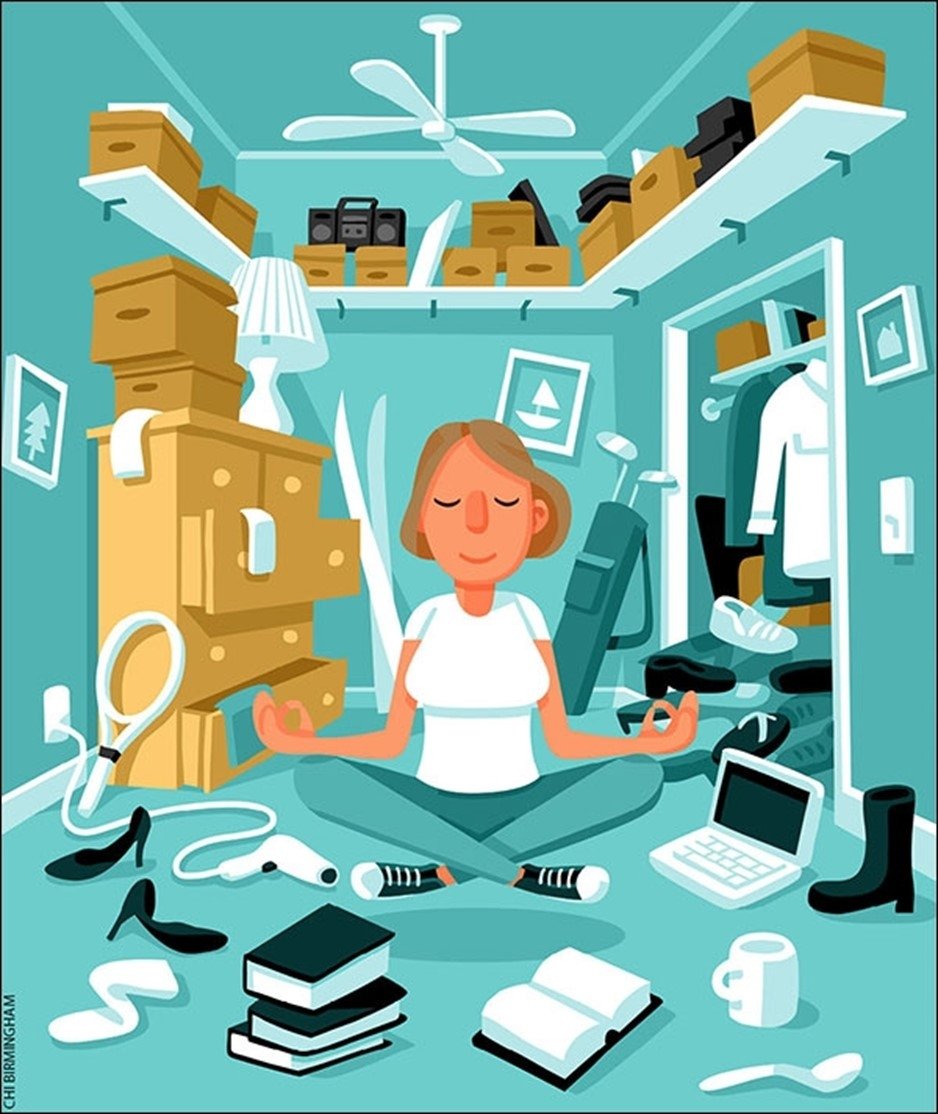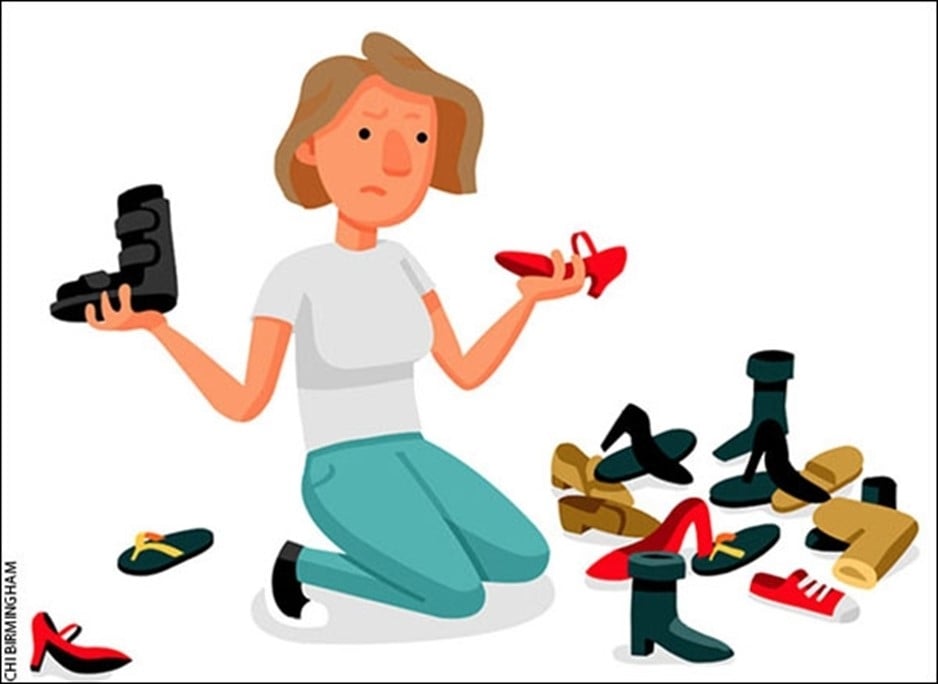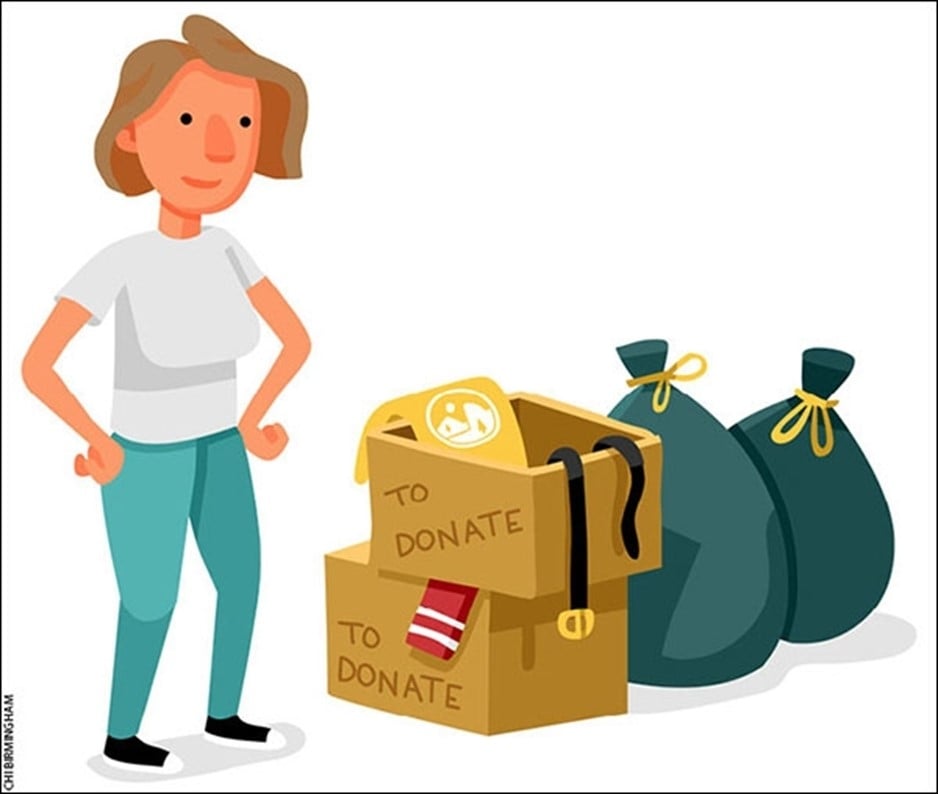Decluttering Your House: The Key to Sorting Through Your Messy Life
One morning, I found myself on my knees, hovering over a pile of shoes, trying to decide which ones to keep and which ones to donate.
Note: This article is from blogger Melissa Balmain, who shares her personal experience using the KonMari method of tidying up.
Marie Kondo is a Japanese author whose book, The Life-Changing Magic of Tidying Up, has become a kind of spiritual book. According to her, when you've lived in a perfectly clean and tidy home, you'll feel like everything is perfect and that you'll never return to disorder. She claims that tidying your home improves every other aspect of your life, whether it's health, career, or relationships. She couldn't have timed her message better, coinciding with the rise of the minimalist movement and the focus on decluttering homes and simplifying schedules.
Following Marie Kondo's approach, more than 4 million copies have been sold globally, and images of people's spotless closets and perfectly folded garments are shared online by followers of her approach. Can this approach, nevertheless, really bring in the world-changing and life-improving effects that are promised?
I was skeptical when I first learned about her approach. Being married with two kids, chaos seemed like the natural state of our home. I loved having a neat home but could never keep it up for longer than a few days. However, I decided to give KonMari a chance.
I also couldn't shake my suspicions regarding Marie's motives. She's been known for her organizing obsession since she first appeared in home and lifestyle magazines at the age of five and started developing the KonMari method in high school. She runs a consulting company in Tokyo, where clients, due to high demand, have to wait three months for an appointment.
Some pointers to assist you with decluttering and organizing your life
1. Get rid of what you don't love
Marie says that the key to effective tidying is to work fast and to start by getting rid of anything you don't need. However, you must first urge yourself to keep going before you can start. Marie suggests using realistic visualization to picture living in a place devoid of clutter.
This meant I had to imagine myself working in a sunny space devoid of scattered boxes, writing at a desk devoid of stray stuff on the floor, and cooking in a kitchen free of overflowing shelves full of storage containers. It was incredibly motivating, and I felt prepared to tackle the significant cleaning task.
Regarding Marie's famous advice, "Hold each possession in your hands and ask, 'Does this spark joy?' If the answer is 'no' and it doesn't bring joy to your heart, then let it go." Finding joy in your belongings is a delightful endeavor.
She says, "Go through each category individually, starting with clothes, books, papers, and then the sentimental items that stir emotions. Begin tidying up, and don't stop until you decide whether to keep or discard each possession. Insist that the momentum of this thorough campaign is crucial to preventing regression, and you must finish it within six months."

And so I ended up on the floor, surrounded by shoes. Why shoes, though? Marie advises starting with frequently worn items because they're relatively easy to decide on. Later, when you tackle more complex items like letters and family photos, you'll have an idea of what brings you joy.
Indeed, when I questioned, "Does it bring me joy?" while holding a pair of my shoes, it took me a moment to respond, but in the end, I was able to answer the question with ease.
Eventually, using the KonMari approach seemed simple.
Week One Recap
- Number of shoe donation bags: Two.
- Number of recycling bags and boxes containing other items from the same closets: Four or more.
- Minutes of feeling more calm and positive: Too many to count.
2. Think hard
Clothes and accessories were next, along with tougher questions than before. Can I bear to place two unworn belts in the donation bag, knowing I wasted money on them? What if I need them later?
What about the three shirts I used to wear before having kids? They hold precious memories, but do I still need them? And what about the scarves my aunt gifted me? They've always been too short, but shouldn't I keep them out of loyalty to her?
These moments prompted me to try to explain to Marie that organization causes worry alongside joy. Unfortunately, the earliest possible date for an interview with her is six weeks away, even though it seems like she would be great at handling chaos in the home. Still, I came up with a smart solution: speaking with Minneapolis life coach Sue Rasmussen, who has coached more than 6,000 individuals and groups. Although her opinions don't always align with Marie's, she says she loves Marie's book and message.
According to Sue, organizing is an extremely intimate conversation about your values, interests, and identity. Regretfully, society has conditioned us to prioritize our obligations to others over our emotions and dictated what constitutes appropriate love.
We don't follow our hearts and gut feelings, so organizing helps you connect with the part of you that knows whether you detest double belts or love elegant red shoes.
I made my own decisions, thanks to Marie's sound advice regarding guilt, nostalgia, and scarcity dread. I reminded myself that the belts had already fulfilled their goal since they had made me happy to purchase them and I thought they would make me look more stylish. Fortunately, I can buy new belts in the future, so I gave away old clothes because my memories didn't depend on the bits of fabric that took up space in my closet.
I did the same with the scarves. They achieved their true purpose by receiving them from my aunt and serving as a reminder of her affection. She didn't want me to hold on to them out of guilt.
Week Two Recap
- Number of recycling bags: Five.
- Relief at not having to glance at those belts in the closet and feeling cramped for not wearing them: A tangible feeling.
3. Don't nag your family
According to Mary, we should help people avoid the stress of owning more than they need or can enjoy in order to demonstrate our compassion for them.
I haven't nagged my family to tidy up with me, not because I'm not persistent, but because it never works. Instead, I've chosen to adopt one of Marie Kondo's guidelines and attempt to set an example for them.
Mary cautions readers against not improving other people's spaces, despite some critics accusing her of supporting the gender-biased notion that tidying up is only for women. She writes, "In fact, quietly working on getting rid of your excess possessions is the best way to deal with a messy family, as if their attraction to what you're doing will make them start getting rid of their unnecessary belongings and organizing them without having to complain once." Thus, I asked 10-year-old Lily to watch as I organized the closets.
Mary doesn't just tell you how to organize; she tells you how to fold too. Rather than piling items on top of one another, you can arrange them into bundles similar to origami and then line them up horizontally so that every item is visible. This way, you won't have to search far for the shirt you're looking for and your clothes won't wrinkle from stacking on top of each other.

Lily seemed impressed by this, but not as much as I was a few hours later when I noticed that she had cleaned and organized a significant portion of her room in addition to her drawers. Davey, 16, cleaned his room almost simultaneously without even noticing my drawers; however, would my husband be next in line?
The stack of clothing, books, and papers beside my husband Bill's bed lingered even after I organized day after day. Worse yet, I found in a closet the crutch he had been using ever since he broke his foot three years prior. I asked him if I could give it away, but he firmly stated, "It's better to keep it for the next time one of us breaks a foot," and he meant it.
I kept my hopes up, and since Bill helps out around the house a lot (unlike some guys), I once asked him, "Doesn't this mess bother you at all?" as I looked at the stack of clothes next to his bed. "Not much," he replied, yet two days later, I noticed the mess shrinking.
Week Three Recap
- Number of bags and boxes collected for donation: Three.
- The number of times I opened my closet and smiled when I saw my beautiful sweaters as if they were ice cream cones: I'm too embarrassed to tell.
4. Learn the art of living better
I still had a long way to go, even after a month of following Kondo's approach. My desk was neat but not very clean, and the glass room still had some boxes. The house now has many organized spaces, like closets, 17 drawers, my desk, the top of the main bathroom sink, and the bad kitchen shelves, from which enough plastic food containers were removed to feed a restaurant for days.
Due to these neat spaces, I've discovered that I much rather pack things away or get rid of them. According to Mary, if you learn to properly choose your possessions, you'll only keep as much as will fit into the available space.
What surprises me is that, even though I haven't finished organizing yet, my life has already begun to change even more, as Mary had promised. I wrote more poems, spent less time on Facebook or TV, and worked out more. I cooked grilled meat and lentil soup instead of relying on fast food almost every night. In addition, I stopped buying new clothes during the sales season because I felt that my old clothes, which became noticeable and appreciated thanks to the KonMari folding method and the joy test, were enough.
According to Sue Rasmussen, organizing your home helps you make better decisions about what to preserve, throw away, or seek in relationships and your career. Additionally, it prompts you to reevaluate your core beliefs and the core of your existence. Imagine being emotionally invested in everything you own, including every piece of paper, paper clip, and thread. Nevertheless, the things that make you happy and bring you benefits are the ones that give you a boost in energy, while the things that drain your energy and make you feel guilty and overweight soak up your energy.
Thus, energy flows back to you as you let go of items you no longer need.
Research supports the idea that the presence or absence of chaos can have a real physical and emotional impact. Psychologists at the University of California, Los Angeles, found in a 2009 study that women who feel their homes are messy are usually less happy in their marriages and live in unhealthy ways due to releasing cortisol. They feel increasingly depressed throughout the day, so it's logical that organizing, at least for women, is beneficial for the body and mind.
The truth is that the husbands in that study were not significantly affected by the chaos. I won't, however, exclude men because Bill was overjoyed the night I reorganized the kitchen shelves and said that it was delightful because he was no longer afraid of cans toppling over his head when he was unloading the dishwasher. He maintained an upbeat vibe all night.

Week Four Recap
- Number of donation bags: four.
- The amount of hope that overwhelmed me to see my house finally tidy, thanks to the momentum inspired by Mary: high.
5. Win Over Yourself
I've been breaking "Marie's" rules in a few different ways since starting the cleaning endeavor, and here's what I did:
1. I didn't organize by category
Marie is strict about this; she always insists on sorting items by category each day, leaving everything else for later. It didn't take me long to see that this would drive me crazy. I had to raid two closets to find every shoe that needed to be organized. Was it practical to organize the shoes first, then put everything else back untouched?
So, I sorted through everything, from carpet remnants to the old cat bed, until I ended up with two neatly organized closets.
2. I sneaked a peek at the contents of books and magazines while deciding what to keep
Despite Marie's advice against it, fearing it would "affect your judgment," how can you judge if a book sparks your interest before you've read it?
3. I rarely spread things out on the floor to organize them
I don't clean my entire house every day or even every week, unlike Marie; therefore, I didn't organize by putting boxes and other stuff on the floor; instead, I put them on a table or bed.
4. I categorized things into groups without much thought
Why take the trouble to arrange scarves when the kitchen items remain jumbled?
5. I missed the six-month deadline
My obligations to my friends, family, and job were and will always be my top priorities. I was relieved to have confided all of this to Sue, as she grows to believe that I am doing well.
Despite Marie's advice to "not adjust the method to suit your personality," many of Sue's clients organize well in other ways, just like she does. Instead of folding clothes the "Marie" way, she chooses to hang them, for instance. Instead of organizing within a set timeframe as if it were a race, she sees it as a lifelong practice. Yet, she lives in a clutter-free home just like Marie's.
Sue says, "Our minds always seek an answer from someone else, which is extremely tempting, but we can take parts of things we love and tweak them slightly to fit our personalities to truly make us happy."
This sounds a lot like the KonMari process, except that our techniques are tested for joy-sparking qualities rather than items. Furthermore, Sue says she always urges people to apply the same standards they use to offer counsel, direction, and guidelines: toss out what doesn't appeal to them and hold onto what does.